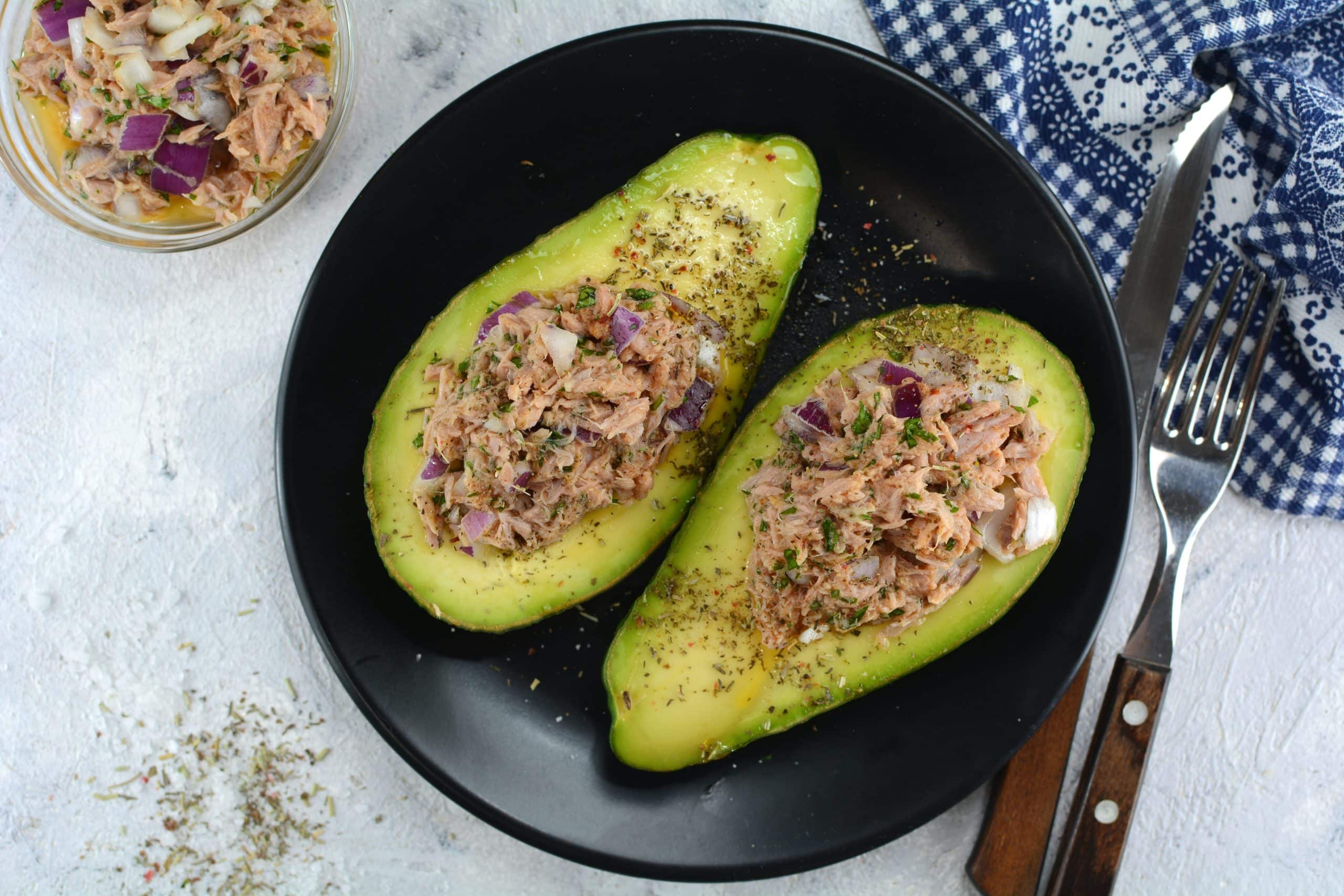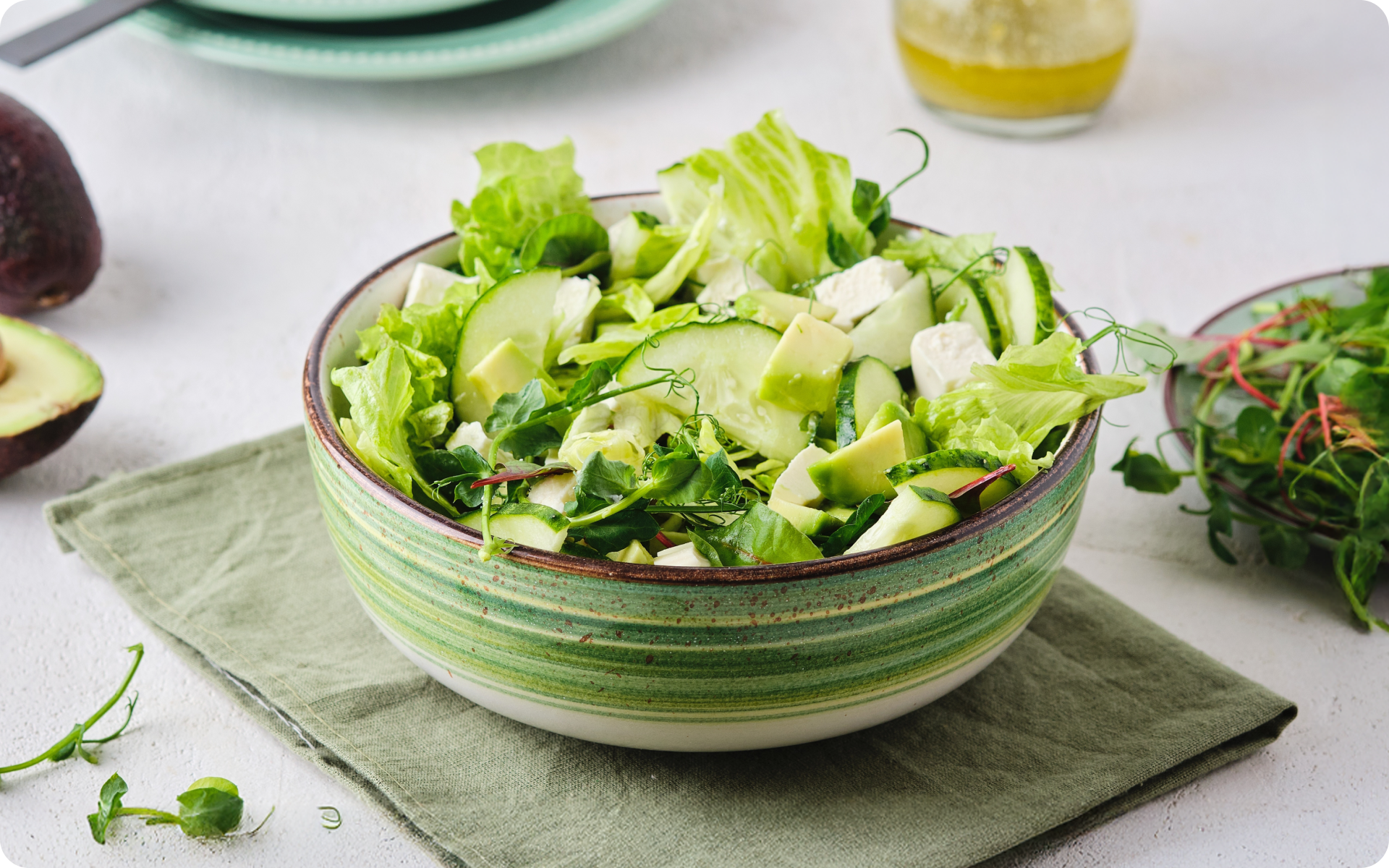You either love them or hate them, but avocados are undeniably a popular food choice these days. Layer them on toast, mash them up for guacamole, or go a little fancy with avocado roses – whatever your preference, it’s clear that avocados have made it to the big leagues.
Taste aside, these creamy fruits are also nutrition powerhouses. They are full of fiber, vitamin E, and a generous helping of monounsaturated fats – which is the type of healthy fat that actually helps you lose fat.
So, naturally, when you go keto, you could be wondering if avocados are part of the equation. The good news is, yes, avocados are definitely keto-friendly. They are low in net carbs (total carbs minus dietary fiber) and high in healthy fats – making them a great fit for the keto diet (10).
That said, there are a few caveats about avocados and the keto diet. Read on to find out why and how to make the most of this nutritious fruit on your keto journey.
What Makes A Food Keto Friendly?
When trying to determine if a food is keto friendly, there are several factors to consider.
First, you should look at the macronutrient content of the food – specifically its fat, protein, and carbohydrate content.
Generally speaking, a keto-friendly food should be low in carbohydrates and contain moderate amounts of protein and high amounts of fat (15). You can get away with some carbohydrates as long as the total carbohydrate content of all the foods you are consuming for the day is within the ketogenic range.
Second, you should look at the glycemic index (GI) of the food. Foods with a low GI (less than 55) are better for keto as they will not cause a large spike in blood sugar, which can lead to cravings and energy crashes (13). Plus, foods that are lower glycemic tend to be more nutrient-dense.
Next, you should consider the type of fat in a food. Healthy fats such as monounsaturated and polyunsaturated fats are beneficial for keto, while unhealthy fats like trans fats should be avoided (2). This means that you should avoid processed and fried foods as much as possible.
Finally, keep in mind that some foods can be high in carbohydrates but still keto friendly – such as dark leafy greens, certain nuts and seeds, low-sugar fruits, and low-carb vegetables. With these foods, you can still enjoy some carbohydrates while staying in the ketogenic range.
Read More: Keto Breakfast Ideas: Low-Carb All The Way
Are Avocados Keto?
Now that we’ve gone over the basics of what makes a food keto friendly, let’s take a look at avocados.
Avocados are an excellent choice for the keto diet as they are:
- Low in net carbohydrates (total carbs minus dietary fiber): Avocados contain approximately 6.4 grams of carbohydrates, by difference per half an avocado (3).
- High in healthy fats: Avocados are packed with monounsaturated and polyunsaturated fats, making them a great source of healthy fats for the keto diet (22).
- Low glycemic: Avocados have a GI of 40, meaning they won’t cause a big spike in blood sugar levels (20).
- Nutrient dense: Avocados are also packed with essential vitamins and minerals, making them a great addition to an ideally nutrient-dense keto diet.
How Much Avocado Can I Eat on Keto?
The Keto diet has faced criticism from some experts for being too high in fat. As avocados are a relatively high-fat food, you might worry that eating too much could be detrimental to your health.
The good news is, you can have your fill of avocados without worrying about going overboard with the fat.
In an analysis of studies, researchers have found that a daily intake of 1-3.7 avocados per day is associated with health benefits. People who ate this amount of avocados daily showed an increase in levels of HDL (the “good” cholesterol) and a decreased risk of heart disease (5).
In a more recent study, researchers found that people who ate some avocado each day had significantly higher gut microbiome diversity (good bacteria) than those who ate none. They also had a reduction in bile acid concentrations, suggesting that avocados may improve gut health and consequently the health of the rest of the body (4).
What about weight gain, you ask? In fact, one avocado contains about 240 calories (3). Surprisingly, eating avocado is associated with weight loss.
A systematic review of studies showed that people who ate avocados had a lower BMI and waist circumference than those who did not eat avocados (1).
Here’s what we can conclude in regard to portion size: You can have one to two avocados per day as part of your keto diet. This amount is associated with health benefits, including weight loss, improved cholesterol levels and gut health (22).
However, you must consider the total fat and carb content of your daily meals to make sure your overall fat and carbohydrate intake for the day is within the ketogenic range.
BetterMe app is a foolproof way to go from zero to a weight loss hero in a safe and sustainable way! What are you waiting for? Start transforming your body now!
Types Of Keto Diets
There are different types of keto diets and as such, total fat and carb amounts may vary (16). Here’s a rough guide:
- Standard Keto Diet: 70-80% of calories from fat, 20-25% of calories from protein and 5-10% of calories from carbs.
- Targeted Keto Diet: 65-75% of calories from fat, 20-25% of calories from protein and 10-15% of calories from carbohydrates.
- Cyclical Keto Diet: 75-90% of calories from fat, 5-10% of calories from protein, and 5-10% of calories from carbohydrates.
So, as long as you are mindful of the total fat and carb content of your meals, then you can enjoy avocados and other keto friendly foods without any problems. Just remember to stay within the recommended daily total fat and carb values for your particular keto diet.
What Happens If You Eat One Avocado a Day on Keto?
Eating one avocado a day while following the keto diet can be beneficial to your health in several ways:
Improving Heart Health
Avocados contain beta sitosterol, a plant-based sterol that helps to reduce cholesterol levels and improve heart health (6). Eating one avocado a day while on keto can help you maintain healthy cholesterol levels, thereby reducing your chances of developing heart disease.
Great for Eye Health
Avocados contain two phyto-chemicals lutein and zeaxanthin, which are essential for eye health. These phyto-chemicals help to reduce the risk of developing macular degeneration and cataracts (9).
Osteoporosis Prevention
Osteoporosis is a condition where bones become weak and fragile due to loss of minerals such as calcium (17). Avocados contain vitamin K, a nutrient that helps the bones absorb calcium and reduce the risk of developing osteoporosis (23).
Osteoarthritis Relief
Avocados contain saponins, a type of antioxidant that helps to reduce inflammation and relieve the pain associated with arthritis (8). While the long-term effects of eating one avocado a day on your arthritis have yet to be determined, it is possible that the saponins in avocados can reduce the pain and inflammation associated with the condition.
Read More: Keto Lasagna: The Low-Carb Answer To Your Italian Food Cravings
Weight Loss
Avocados are high in healthy monounsaturated fats, which can help you feel full longer and reduce your food cravings (11). Research has shown that reducing your food cravings can help you lose weight, making it an ideal food for those following the keto diet (12).
Cancer Prevention
Avocados contain a number of compounds and antioxidants, including carotenoids, flavonoids and polyphenols. These compounds have been linked to reducing the risk of cancer and slowing the progression of existing cancerous cells (18).
The mechanism of action needs more research, but studies suggest that these compounds help to fight free radicals and reduce inflammation.
Improving Digestive Health
Avocados are high in fiber, which helps to keep your digestive system healthy. Studies have found that fiber can reduce the risk of developing colon cancer, improve digestion, and also reduce cholesterol levels (14).
Furthermore, the presence of healthy fats in avocados can help reduce inflammation, which is beneficial for digestive health (19).
Reducing Depression Symptoms
Avocados contain a number of vitamins and minerals that may help improve your mood.
Folate, a B-vitamin present in avocados, has links to reducing symptoms of depression. It does so by preventing the body from producing excess amounts of homocysteine, an amino acid that is linked to depression (21).
How Can I Eat Avocado on Keto?
If you are looking to incorporate avocados into your keto diet, there are a few ways that you can do so.
- As a healthy spread on low-carb toast or crackers
- Add them to salads for a creamy texture
- As a dip for veggies, low-carb chips, or hard-boiled eggs
- As a topping for keto burgers and sandwiches
- Blend them into smoothies or shakes
- Add it to your favorite keto-friendly soup or stew
- In a veggie bowl with cooked eggs and veggies
Whether you’re a workout beast or just a beginner making your first foray into the world of fitness and dieting – BetterMe has a lot to offer to both newbies and experts! Install the app and experience the versatility first-hand!
Frequently Asked Questions
Is Avocado Keto-Friendly?
Yes, avocados are generally considered to be keto-friendly. They are high in healthy monounsaturated fats and low in carbs, making them a great addition to any keto diet.
How Many Carbs Does an Avocado Have?
One medium avocado contains about 17g of carbs, with 13g of those being fiber (7). This makes them a great source of low-carb, high-fiber food.
How Many Avocados Can I Eat on Keto?
It is recommended that you limit your consumption of avocados to one or two per day. Eating too much can lead to an increase in calories and can have a negative impact on your weight loss goals.
What Are the Health Benefits of Eating Avocado?
Eating avocado can provide a number of health benefits, including reducing inflammation, improving digestion, boosting bone health, and reducing the risk of cancer.
Additionally, they are a great source of healthy fats that can help to keep you satiated for longer and reduce cravings.
Can I Eat Avocado Every Day?
Yes, you can eat avocado every day as part of a well-balanced diet. However, it is important to consider your overall caloric intake and make sure that you are not over-consuming calories.
Additionally, it is important to be mindful of the other foods you are consuming in order to ensure you are meeting your nutritional needs.
Conclusion
Avocados can be a great addition to any keto diet, as they are low in carbs and high in healthy fats and fiber. Eating avocado can provide a number of health benefits, including reducing inflammation, improving digestion, boosting bone health, and reducing the risk of cancer.
DISCLAIMER:
This article is intended for general informational purposes only and does not serve to address individual circumstances. It is not a substitute for professional advice or help and should not be relied on for making any kind of decision-making. Any action taken as a direct or indirect result of the information in this article is entirely at your own risk and is your sole responsibility.
BetterMe, its content staff, and its medical advisors accept no responsibility for inaccuracies, errors, misstatements, inconsistencies, or omissions and specifically disclaim any liability, loss or risk, personal, professional or otherwise, which may be incurred as a consequence, directly or indirectly, of the use and/or application of any content.
You should always seek the advice of your physician or other qualified health provider with any questions you may have regarding a medical condition or your specific situation. Never disregard professional medical advice or delay seeking it because of BetterMe content. If you suspect or think you may have a medical emergency, call your doctor.
SOURCES:
- A Comprehensive Review of Hass Avocado Clinical Trials, Observational Studies, and Biological Mechanisms (2021, mdpi.com)
- A healthy approach to dietary fats: understanding the science and taking action to reduce consumer confusion (2017, biomedcentral.com)
- Avocado, raw (2022, fdc.nal.usda.gov)
- Avocado Consumption Alters Gastrointestinal Bacteria Abundance and Microbial Metabolite Concentrations among Adults with Overweight or Obesity: A Randomized Controlled Trial (2021, sciencedirect.com)
- Avocado consumption and risk factors for heart disease: a systematic review and meta-analysis (2018, sciencedirect.com)
- Avocado Consumption and Risk of Cardiovascular Disease in US Adults (2022, ncbi.nlm.nih.gov)
- Calories in Avocado (n.d., nutritionix.com)
- Dietary Phytochemicals: Natural Swords Combating Inflammation and Oxidation-Mediated Degenerative Diseases (2016, hindawi.com)
- Dietary Sources of Lutein and Zeaxanthin Carotenoids and Their Role in Eye Health (2013, mdpi.com)
- Effect of a high-monounsaturated fat diet enriched with avocado in NIDDM patients (1994, pubmed.ncbi.nlm.nih.gov)
- Effect of fat saturation on satiety, hormone release, and food intake (2009, academic.oup.com)
- Food Cravings and Body Weight: A Conditioning Response (2019, ncbi.nlm.nih.gov)
- Glycemic index, glycemic load and glycemic response: An International Scientific Consensus Summit from the International Carbohydrate Quality Consortium (ICQC) – ScienceDirect (2015, sciencedirect.com)
- Health benefits of dietary fiber (2009, academic.oup.com)
- Ketogenic Diet (2022, ncbi.nlm.nih.gov)
- Ketogenic diets: Boon or bane? (2018, ncbi.nlm.nih.gov)
- Osteoporosis: Pathophysiology and therapeutic options (2020, ncbi.nlm.nih.gov)
- Role of Phytochemicals in Cancer Chemoprevention: Insights (2021, mdpi.com)
- Science of Fatty Acids and Inflammation (2015, academic.oup.com)
- Starch composition, glycemic indices, phenolic constituents, and antioxidative and antidiabetic properties of some common tropical fruits (2015, sciencedirect.com)
- The association of folate and depression: A meta-analysis (2017, sciencedirect.com)
- The Forgotten Fruit: A Case for Consuming Avocado Within the Traditional Mediterranean Diet (2020, frontiersin.org)
- Vitamin K and Osteoporosis (2020, mdpi.com)












